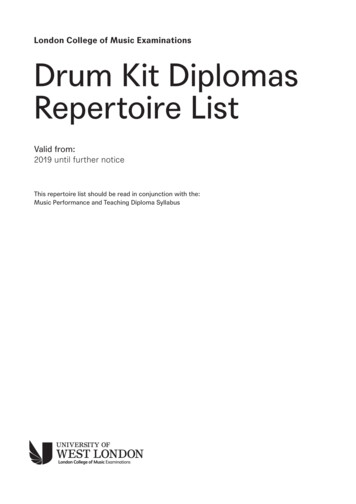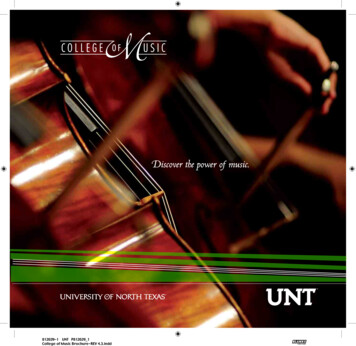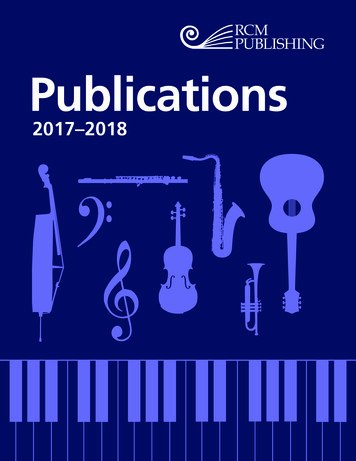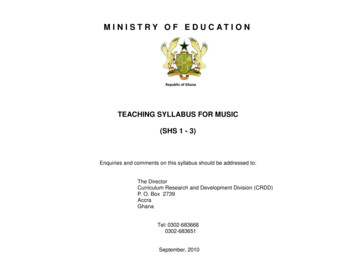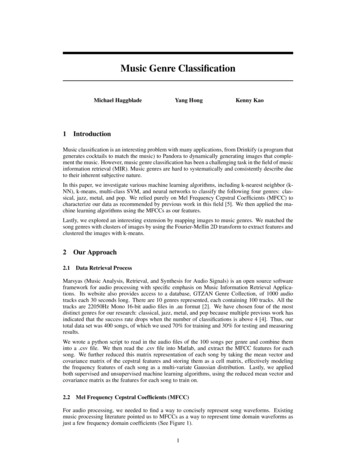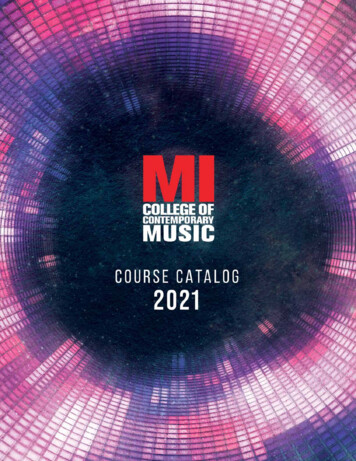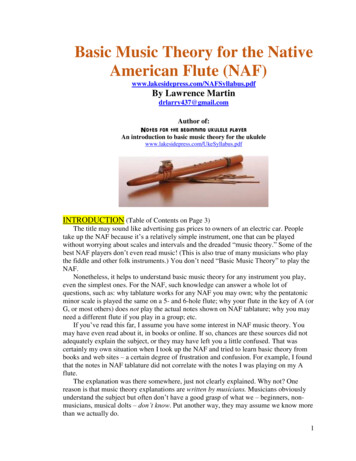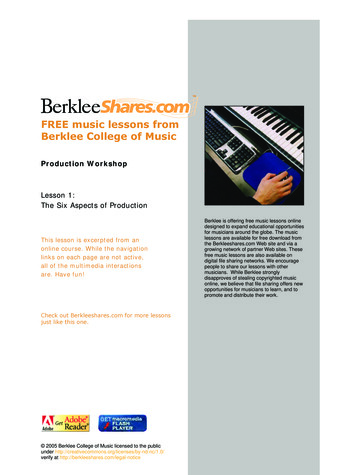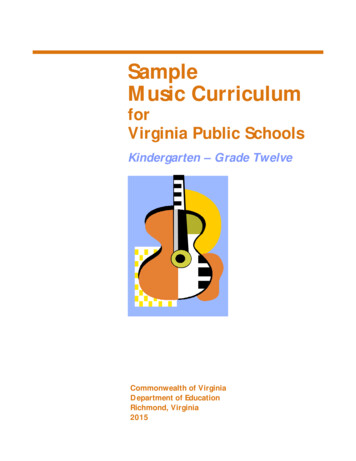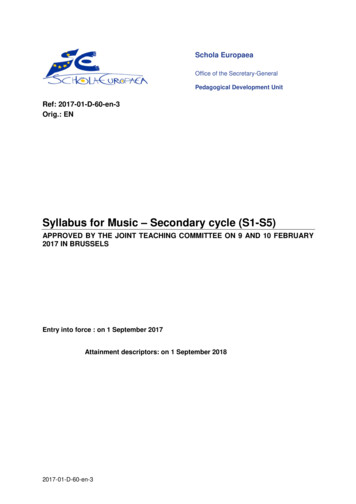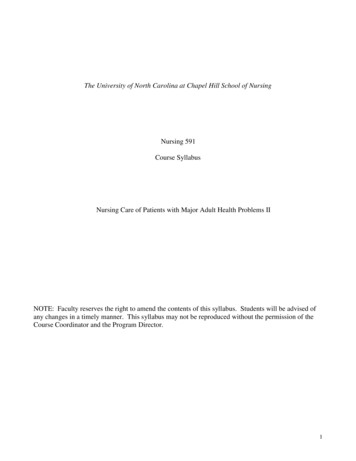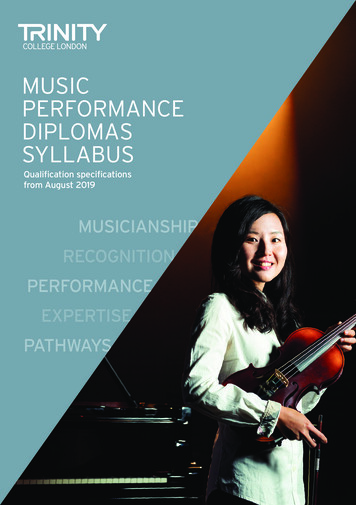
Transcription
MUSICPERFORMANCEDIPLOMASSYLLABUSQualification specificationsfrom August HWAYS
WHAT’S CHANGED? Repertoire lists have been refreshed and extended, providing candidates with a wider rangeof suggested programme content Repertoire lists are now exclusively available online at trinitycollege.com/performance-diplomas,allowing them to be updated at regular intervals Instrument-specific information can now be found online within the repertoire list PDFs Increased detail about how the diplomas are marked is included in our updatedassessment criteria Assessment of stagecraft has been moved to the recital section There is now increased mark weighting for performance, ensuring that candidates’ resultsfully reflect their performance standard Detailed programme notes are no longer required for ATCL and LTCL diplomas The presentation skills section has been renamed as programme & planning Requirements for teaching diplomas are now available separatelyKEEP UP TO DATEPlease check trinitycollege.com/performance-diplomas to make sure you are using thecurrent version of the syllabus and repertoire lists, and for the latest information about ourmusic diplomas.OVERLAP ARRANGEMENTSThis syllabus is valid from 1 August 2019. The 2009–2018 syllabus is valid until 31 July 2019.There will be no overlap between syllabuses, meaning that all exams from 1 August 2019onwards will use this syllabus.
MUSICPERFORMANCEDIPLOMASSYLLABUSQualification specificationsfrom August 2019Trinity College Londontrinitycollege.comCharity number 1014792Patron HRH The Duke of Kent KGChief Executive Sarah KempCopyright 2018 Trinity College LondonPublished by Trinity College LondonOnline edition, November 20181
Contents3/Welcome4/Introduction to Trinity’s music performance diplomas9/Learning outcomes10 /About the exams12 /Exam guidance: Recital16 /Exam guidance: Programme & planning17 /Exam guidance: Marking22 /Policies24 /Diploma resourcesTrinity accepts entries for its exams on the condition that candidates conform to therequirements of the appropriate syllabus. Any amendments to the requirements willbe published on our website and in reprints of the document.2
WelcomeWelcome to Trinity College London’s Music Performance Diplomas syllabus, containing details ofperformance qualifications in a range of instruments, and singing. Trinity’s performance diplomasprovide a pathway to professional musicianship, focusing exclusively on the planning andperformance of a recital.Performance pathwaysTrinity’s performance diplomas are available at three levels: ATCL, LTCL and FTCL, eachreflecting progression beyond graded exams and providing pathways into professionalmusicianship. This updated syllabus for diploma exams from August 2019 sees the addition ofover 1,200 new pieces to our repertoire lists, giving candidates more choice. Combined with theoption to select own-choice pieces, this means that candidates can present programmes thatreflect their own unique musical interests and strengths. The emphasis of these qualificationsis on performance, with 96% of marks awarded for the recital section at ATCL and LTCL levels.Candidates also provide a short written programme, just as they would when putting togethera professional recital.Performance expertiseSubmit your programme online with our approvals form and receive feedback from our panel ofinstrumental experts. You can also develop your performance with our range of support resourcesavailable at trinitycollege.com/diploma-resources, which include guidance on exam structure andpreparation, support on building a programme and advice and inspiration from our professionaldiploma alumni.Performance recognitionGain a respected qualification that is recognised globally. Our performance diplomas are apathway to professional musicianship, and successful candidates are entitled to use post-nominalletters after their name: ATCL (Associate of Trinity College London) LTCL (Licentiate of Trinity College London) FTCL (Fellow of Trinity College London)We hope you enjoy exploring the music on offer in this syllabus and we wish you every successin the exams and your wider music-making.ABOUT TRINITY COLLEGE LONDONTrinity College London is a leading international exam board and independent education charitythat has been providing assessments around the world since 1877. We specialise in the assessmentof communicative and performance skills covering music, drama, combined arts and Englishlanguage. With over 850,000 candidates a year in more than 60 countries worldwide, Trinityqualifications are specifically designed to help students progress. Our aim is to inspire teachersand learners through the creation of assessments that are enjoyable to prepare for, rewarding toteach and that develop the skills needed in real life.At the heart of Trinity’s work is the belief that effective communicative and performance skills arelife enhancing, know no boundaries and should be within reach of us all. We exist to promote andfoster the best possible communicative and performance skills through assessment, content andtraining that is innovative, personal and authentic.3WelcomeWelcome
Introduction to Trinity’s music performance diplomasIntroduction to Trinity’s musicperformance diplomasOBJECTIVE OF TRINITY’S MUSICPERFORMANCE DIPLOMAQUALIFICATIONSTrinity’s music performance diplomas arefor musicians who wish to demonstratehigher-level performance skills and havethem professionally recognised.They offer learners the opportunity to measuretheir musical development against a seriesof internationally understood benchmarks atthree levels: Level 4 — equivalent standard to the firstyear of an undergraduate degree course Level 6 — equivalent standard to the finalyear of an undergraduate degree course Level 7 — equivalent standard to a masterslevel courseWHO THE QUALIFICATIONS ARE FORTrinity’s music performance diplomasare open to all learners, and there are noage restrictions.Trinity is committed to making its examsaccessible to all, and each candidate istreated individually when consideringhow assessments can be adapted forthose with special needs. Find out moreat trinitycollege.com/music-csnENTRY REQUIREMENTSThere are no prerequisites for ATCL or LTCL.The prerequisite for FTCL is LTCL in the sameinstrument. Candidates who have passed LTCLshould indicate this in the appropriate placeon the entry form. Candidates wishing to takeFTCL who do not have an LTCL may substitutean equivalent qualification, or offer priorlearning at a similar level.4Any substitute qualification or prior learningmust be approved by Trinity.Examples of alternative qualifications acceptedin place of LTCL include: ARCM, ARNCM, LGSMD(P), LMusA, LRAM,LRSM, LLCM diplomas in performance, inthe same instrument Other performance diplomas of graduatestatus, eg GTCL, GRSM, in the sameinstrument BA (with performance) or BMus from aconservatoire, eg Trinity Laban, or froma university, in the same instrumentApplications for approval of substitutequalifications or prior learning must be sentto music@trinitycollege.com at least sixweeks before the closing date for entries atthe chosen exam centre. Applicants shouldattach as much evidence as possible oflearning gained. This may include transcripts,syllabuses, concert programmes, references,etc. Each case will be considered on itsindividual merits. If the application is approved,Trinity will supply a reference number whichmust be quoted on the entry form.Candidates may not enter for an exam untilthey have received this reference number;provisional and conditional entries cannotbe accepted.
Introduction to Trinity’s music performance diplomasDURATION OF STUDY (TOTAL QUALIFICATION TIME)Guided learning hours(GLH)Independent learning hours(ILH)Total qualification time(TQT) 250ASSESSMENT AND MARKINGRECOGNITIONTrinity’s performance diploma qualificationsare assessed by external examiners trainedand moderated by Trinity. Examiners providecomments for each component of the examusing the assessment criteria relevant to thelevel as outlined on pages 18–21, and at ATCLand LTCL levels they also provide marks.Trinity College London is an internationalexam board regulated by Ofqual (Officeof Qualifications and ExaminationsRegulation) in England, CCEA Regulationin Northern Ireland and by QualificationsWales. Various arrangements are inplace with governmental educationauthorities worldwide.ATCL and LTCL diplomas are marked outof 100. Candidates’ results correspond todifferent attainment levels as follows:Total markAttainment level(ATCL & LTCL)80–100DISTINCTION60–79PASS45–59BELOW PASS 10–44BELOW PASS 2FTCL diplomas do not have marks awarded;candidates are assessed as Approved orNot Approved.IntroductionAll regulated qualifications are assigned a total qualification time. This should be used asguidance only. Total qualification time is an estimate of the average time a candidate spendswith a teacher (guided learning hours) added to the average time spent learning independently.It is recognised that the amount of time needed to commit to a qualification will be dependenton each individual’s level of experience.WHERE THE QUALIFICATIONSCOULD LEADWhile for some learners music performancediplomas represent a personal goal orobjective, they can also be used as aprogression route towards: Higher level diplomas offered by Trinityand by other awarding organisations Postgraduate music courses atconservatoires and universities Employment opportunities in musicand the creative artsSee page 17 for further information about howthe exams are assessed.5
Introduction to Trinity’s music performance diplomasHOW TO ENTER FOR AN EXAMExams can be taken at selected Trinitypublic exam centres, which are availablethroughout the world. Details are available attrinitycollege.com/worldwide, and candidatesshould contact their local Trinity representativefor more information.OTHER QUALIFICATIONS OFFEREDBY TRINITYTrinity’s music qualifications offer flexibleprogression routes from beginner to advancedlevels in a range of musical styles. All aredesigned to help candidates develop asmusicians according to their individual needsas learners.Graded music exams assess a broad range ofmusicianship skills, including performance,while certificate exams focus entirely onperformance, including separate marks forpresentation. Find more information aboutgraded exams at trinitycollege.com/graded-exams, and information aboutcertificate exams at trinitycollege.com/music-certificatesCandidates can enter any combination ofgraded or certificate exams, and do not needto pass any particular level in order to proceedto a higher level.6Theory exams are available from Grade 1 tosupport learners to develop their understandingof the technical language of music. However, notheory qualifications or other prerequisites arerequired to enter graded or certificate exams atany level. Find more information about theoryexams at trinitycollege.com/theoryAs well as performance, diplomas are alsoavailable in teaching (ATCL and LTCL) andtheory (AMusTCL and LMusTCL). Find outmore at trinitycollege.com/music-diplomasMusic Tracks is an initiative in the UK designedto support teachers in delivering instrumentaltuition for both large and small groups. Find outmore at trinitycollege.com/music-tracksWe also offer: Graded, certificate and diplomaqualifications in drama-related subjects English language qualifications Teaching English qualifications Arts Award (only available incertain countries)Specifications for all these qualificationscan be downloaded from trinitycollege.com
Introduction to Trinity’s music performance diplomasREGULATED LEVELS OF TRINITY’S MUSIC QUALIFICATIONSEQF**LevelClassical& Jazz77FTCL66LTCLLMusTCL45ATCLAMusTCL321EntryLevel 34Rock& PopTheory& WrittenMusicSoloGroupTracks† Certificates† Certificates†Grade 8Grade 8Grade 8Grade 7Grade 7Grade 7Grade 6Grade 6Grade 6Grade 5Grade 5Grade 5Grade 4Grade 4Grade 4Grade 3Grade 3Grade 3Grade 2Grade 2Grade 2Track 2Grade 1Grade 1Grade 1Track lTrackFirstAccessTrack* Regulated Qualifications Framework in England and Northern Ireland** European Qualifications Framework† Not RQF or EQF regulated7IntroductionRQF*Level
Introduction to Trinity’s music performance diplomasREGULATED TITLES AND QUALIFICATION NUMBERSFOR MUSIC PERFORMANCE DIPLOMASRegulated titleQualificationnumberATCLTCL Level 4 Diploma in Music Performance600/0949/4LTCLTCL Level 6 Diploma in Music Performance600/0984/6FTCLTCL Level 7 Diploma in Music Performance600/0985/8GUIDANCE ON THE EXAMS Diploma exams do not take place with audiences. Examiners do not normally interrupt performance diploma exams with any conversation,but will observe the candidate’s professionalism and stagecraft at every stage of the exam.Candidates should treat the exam as if it were a public recital. Throughout the exam, examiners make notes for the report, in order to give professionalfeedback for development, and so they may not be able to closely watch the performanceat all times. Special arrangements can be made if an interpreter or a facilitator for a candidate with specialneeds is necessary. Such arrangements must be agreed in advance with Trinity’s central office— email music-csn@trinitycollege.com All exams are audio-recorded for quality assurance purposes. Further information is availableat trinitycollege.com/recordingPOST-NOMINALS AND ACADEMIC DRESSIn addition to being entitled to use the appropriate post-nominal letters after their name (ATCL,LTCL or FTCL), holders of Trinity diplomas are entitled to wear academic dress. Associates areentitled to wear an academic gown, Licentiates a gown and hood (purple edged with mauve), andFellows a gown and hood (purple lined with mauve). Candidates wishing to obtain academic dressshould email music@trinitycollege.com for appropriate authorisation.8
Learning outcomesLearning outcomesLearning outcomesATCL(RQF Level 4)LEARNING OUTCOMESThe learner will: Present a fluent and accurate performance of the repertoire Be able to execute all technical aspects of the music at a standard commensurate with the level Communicate through a developing musical voiceLTCL(RQF Level 6)LEARNING OUTCOMESThe learner will: Present a fluent and accurate performance of the repertoire, with contextual understandingof the material Communicate all technical and artistic aspects of the music at a standard commensuratewith the level Demonstrate their own musical voice in interpreting the performance objectives, drawingupon a variety of experiences in individual performanceFTCL(RQF Level 7)LEARNING OUTCOMESThe learner will: Demonstrate musical skills, knowledge and understanding at the forefront of the discipline Demonstrate acute judgement and insight, drawing upon creative approaches in individualperformance which are based on research into performance practice Demonstrate a highly developed and individual artistic and musical personality, presentingthe programme to public recital standard9
About the examsAbout the examsEach exam has two sections: recital and programme & planning.RECITALPROGRAMME & PLANNINGCompile and perform a programmeof pieces, chosen from publishedrepertoire lists, own-choice repertoire,or a combination of listed andown-choice repertoire.Plan a balanced programme thatincludes contrasting styles, andprovide a written programme.RECITAL96 MARKS*PROGRAMME& PLANNING4 MARKS*10* Marks are awarded for ATCL and LTCL only
About the examsEXAM STRUCTURE AND MARK SCHEME(MARKS APPLY TO ATCL & LTCL ONLY)SUBJECTS OFFEREDPerformance diplomas are available in thefollowing subjects:Maximummarks Piano96 OrganRECITAL Harpsichord SingingPROGRAMME & PLANNING4 Recorder Flute Oboe Planning, balance & construction ofthe programme ClarinetTOTALAbout the exams Written programme Saxophone100 Bassoon Horn in F Trumpet / Bb cornet / Eb cornet Trombone Bass trombone Tenor horn Baritone / Euphonium Tuba / Eb bass / Bb bass Drum kit Percussion Violin Viola Cello Double bass Harp GuitarRepertoire lists for the above subjects areavailable at trinitycollege.com/performancediplomasCandidates wishing to perform on aninstrument that is not listed shouldcontact Trinity’s music support teamat music@trinitycollege.com11
Exam guidance: RecitalExam guidance: RecitalNB any programme including singlemovements from items listed as completemust be submitted for approval, so thatwe can offer guidance to ensure all piecesare at a suitable level.RECITAL96 MARKS*CHOOSING PIECES Candidates should compile and perform avaried and contrasting programme of therequired duration (see timings opposite). Performance programmes should displaya range of moods, styles and tempi.Candidates should bear the artisticcoherence of the programme in mind whenselecting repertoire and/or proposingprogrammes for approval. See page 16 formore information.RECITAL TIMINGS Timings are as follows: All programmes (except percussion)must consist of a minimum of two works.Percussion programmes must consist ofa minimum of three works. The music performed can:— Be drawn entirely from the appropriaterepertoire list, which can be found onlineat trinitycollege.com/performancediplomas— Combine pieces from the appropriaterepertoire list with own-choice pieces— Contain only own-choice 0 Please note that the performance durationslisted above refer to the total duration of allthe pieces performed, but do not include thefollowing, which are included in the overallexam duration:— Arrival/departure timeREPERTOIRE GUIDELINES— Setting up Sonatas, sonatinas, suites and other workscomposed as complete unities shouldnormally be played complete (ie all sectionsor movements should be played).— Tuning Depending on the diploma level and therepertoire available for the instrument,candidates may include selectedmovements, provided that the overallprogramme is balanced. Suitable examplesof selected movements are included in therepertoire lists.12Excessive breaks between movements and/or pieces should be avoided. Performances that fall outside the listeddurations will be referred to Trinity’scentral office and will be penalised by amark reduction or, in extreme cases, bydisqualification. Performances that exceedthe required duration may be stopped whenthe maximum length is reached.* Marks are awarded for ATCL and LTCL only
Exam guidance: RecitalOWN-CHOICE REPERTOIREPROGRAMME APPROVAL Candidates wishing to propose a programmeconsisting partly or completely of piecesthat are not listed in the relevant repertoirelist (available at trinitycollege.com/performance-diplomas) must submitthe whole programme for approval.Programmes must also be submitted ifthey include single movements from itemslisted as complete in the repertoire list.The process for submitting programmesis outlined below. We offer an online programme approvalsprocess, which puts you directly in touchwith our panel of instrumental experts.Candidates should visit trinitycollege.com/approvals and provide all details as requestedon the online form. Own-choice pieces must demonstrate acomparable level of technical and musicaldemand to the pieces listed in the repertoirelist for the relevant instrument, available attrinitycollege.com/performance-diplomas Inclusion of repertoire items in any otherexam board’s diploma lists does notguarantee that they will be approved fora Trinity diploma. Items considered to be of greater demandthan the level may be proposed, but maynot then be performed in any higher leveldiploma subsequently entered (ie candidatesmay not submit the same piece of music fortwo or more diplomas at increasing levels). Our online approvals process enables youto check the level of the repertoire with thehelp of our experts. Items are considered inthe context of the whole programme, andpieces approved in one programme may notnecessarily be approved in another. Please note that we are unable to considersubmissions of individual pieces. Our panel of expert instrumentalspecialists consider own-choice programmesubmissions, and applicants normallyreceive a response within 15 working days. If the proposal is accepted we will email thecandidate a permission statement, whichwill remain valid for two years. A copy of thestatement must be shown to the examinerat the start of the exam, otherwise resultsmay be delayed or the candidate maybe disqualified. If the proposal is not approved we will notifythe candidate by email. The candidateshould then change piece(s) as necessaryand re-submit the whole programme (orreplace the whole programme with piecesfrom the relevant repertoire list). In approving programme proposals wedo not consider either timing or balance.The approval is simply in terms oftechnical and musical difficulty, and it isthe candidate’s responsibility to design anappropriate and balanced programme thatcomplies with the stipulated timings. Once an approval letter has been issued, ifany alteration needs to be made then thecomplete programme must be resubmittedfor approval.13Exam guidance: Recital Before submitting a programme, candidatesshould check each own-choice item againstTrinity’s current grade, certificate anddiploma repertoire lists. Repertoire listedin any current Trinity grade, certificateor lower diploma cannot be selected asown-choice repertoire. However, wherea movement or part of a piece is set fora graded exam, the whole piece may besubmitted as an own-choice diploma item. Candidates must submit completeprogrammes and may send in only onecomplete programme for approval atany time.
Exam guidance: Recital Where an online submission is not possible,an application by post or email may bemade, but it may take longer to process.Telephone applications are not accepted. Trinity cannot accept responsibilityif candidates enter for an examwithout approval for their programme.Candidates are strongly advised not to enteruntil their programme has been approved. Trinity’s decision on approval of any item orprogramme is final.INSTRUMENTS Candidates should only perform on one typeof instrument throughout their recital. Candidates may, however, use two or moredifferent members of the same instrumentfamily, eg soprano and alto recorders, or Bband Eb trumpets. For all diplomas other than piano, candidatesmust provide their own instrument(s) (NBarrangements for organists are detailed inthe organ repertoire list online). If the instrument takes time to set up, egdrum kit, candidates must make suitablearrangements with the centre in advance sothat the exam timetable is not affected bysetting up or removing the instrument. Candidates must complete basic tuningbefore entering the exam room. Piano candidates are allowed a fewmoments to familiarise themselves withthe piano at the start of the exam. Instrument-specific informationand requirements are included in therelevant repertoire lists available attrinitycollege.com/performance-diplomas Candidates wishing to perform on aninstrument that is not listed on page 11should contact Trinity’s music support teamat music@trinitycollege.com14PERFORMANCE AND INTERPRETATION All da capo and dal segno instructionsshould be observed. Repeats of theexposition/recapitulation sections andother long repeats, as well as those withinvariations, should not be played. If theexaminer feels that the overall performingtime of the recital has been compromised,for instance by the inclusion of repeatsin other areas that are not justifiedmusically, the exam may be referred and/or invalidated. All cadenzas should be played; these may beimprovised or played from scores. Candidates are not required to performfrom memory at any level, and no additionalmarks are given for this. However,candidates are encouraged to play all or partof their programme from memory if theyfeel that it will enhance their performance. Spoken introductions are not permitted.STAGECRAFT Marks are awarded for stagecraft, whichtakes into account the overall presentationof the recital. For all performers and participants,stagecraft includes:— Management of music and page turns,including use of a page turner whereappropriate— General comportment and stage manner— Dress, which should be suitable for apublic recital (jeans and trainers are notconsidered appropriate dress)— Pacing; breaks between movements andworks should neither hurry nor disruptthe flow of the recital Additionally, for all instrumentalists (otherthan pianists), positioning and platformarrangement are taken into account.
Exam guidance: RecitalACCOMPANIMENTSMUSIC AND COPIES For single-line instruments, no morethan one unaccompanied piece shouldbe included. Candidates should obtain the music for theirexam in good time before entering for theexam, and they must bring it with them onthe day of the exam. Pieces that are published withan accompaniment must not beperformed unaccompanied. Candidates are responsible for providingtheir own accompanist. There shouldnormally be only one accompanist, althoughthere may be two in some cases, eg Baroquecontinuo group. Recorded accompaniments are not allowedin diploma exams except where required bythe genre, in which case approval must beobtained in advance of the exam. Any electrical equipment used must complywith the health and safety requirements ofthe country where the exam is taking place.PAGE TURNS The examiner will not be able to act as apage turner. A page turner is allowed to turn pages forthe soloist in piano, harpsichord, organ orharp diplomas, or for the accompanist inany other diploma. We take copyright infringement seriouslyand require candidates to ensure theirmusic comes from a legitimate source.Guidelines are available in the UK MusicPublishers Association’s Code of FairPractice, available at mpaonline.org.uk.Candidates must comply with copyrightand other intellectual property laws in thecountry where the exam is taking place. In accordance with the MPA’s Code of FairPractice, candidates must produce originalcopies of all pieces to be performed at theexam, even if pieces have been memorised,handwritten or typeset. Pieces where nooriginal copy has been provided might beawarded no marks. Candidates must provide copies of allpieces to be performed as a reference forthe examiner (these may be photocopies).Failure to provide copies will result ininvalidation of the exam. If photocopies areprovided, these will be kept by the examinerand destroyed after the exam. Where music has been downloaded,candidates must bring proof of purchase ordetails of the website where it was accessedfor the examiner’s reference.15Exam guidance: Recital Where accompaniments feature longintroductions or endings (or long tuttipassages in concerto movements), theseshould be shortened in a way that ismusically appropriate. Recommended editions are indicated inthe repertoire lists, but candidates mayperform from any reliable edition that hasnot been shortened or otherwise simplified.Editions containing inauthentic performancedirections, for example Romantic phrasing inBaroque repertoire, are not acceptable.
Exam guidance: Programme & planningExam guidance:Programme & planning At FTCL level, programmes must includethe following:— Names of the candidate and accompanist(if applicable)— Date, place and time of the recitalPROGRAMME& PLANNING4 MARKS*— Composers, full titles and opus numbers(where available) of all the works to beplayed, in order of performance— An accurate timing for each piece, andfor the entire programme— Programme notes on each piece to beperformed, totalling 1,200–1,600 wordsoverallThis section of the exam is split into two:— For singing diplomas only: translationsof the song texts (not included inword count)WRITTEN PROGRAMME2 marks Candidates should present a printedprogramme to the examiner at thebeginning of the exam. At ATCL and LTCL levels, programmes mustinclude the following:— Names of the candidate and accompanist(if applicable)— Date, place and time of the recital— Composers, full titles and opus numbers(where available) of all the works tobe played, in order of performance(NB detailed notes on the pieces arenot required) A t FTCL level, the content of theprogramme notes might include themusical and historical context of the pieces,their structure and form, and significantmusical elements contained within them. They may include quotations and shortextracts from other sources (creditedas appropriate), but must not plagiariseother sources.PLANNING, BALANCE & CONSTRUCTIONOF THE PROGRAMME2 marks Examiners will consider the extent to which:— An accurate timing for each piece, and forthe entire programme— For singing diplomas only: translations ofthe song texts16* Marks are awarded for ATCL and LTCL only— The programme is well balanced andincludes a contrast of styles— The programme order is musicallyeffective, and the programme isartistically effective as a whole
Exam guidance: MarkingExam guidance: MarkingATCL & LTCL: HOW THE EXAM IS MARKEDATCL & LTCL: RECITALExaminers give comments and marks forboth section of the exam, up to the maximummarks listed in the table on page 11. It is notnecessary to pass both sections in order toachieve a pass overall. The total mark for theexam corresponds to different attainmentlevels as follows:The recital is awarded three separate marksfor specific musical components, allowingcandidates to receive precise feedbackabout specific aspects of their performance.These marks combine to give an overall markfor the recital
current version of the syllabus and repertoire lists, and for the latest information about our music diplomas. OVERLAP ARRANGEMENTS This syllabus is valid from 1 August 2019. The 2009–2018 syllabus is valid until 31 July 2019. There will be no overlap between syllabuses, meaning that all exams from 1 Aug
